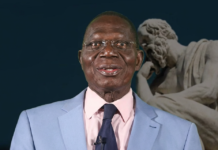By Sunny Awhefeada
The twin motif of appearance and reality frames a great deal of the experience recounted in literary texts. The concept speaks to the truth that things are not always what they seem to be. From Chaucer to Chinua (Achebe), the world has been fed with verses, yarns and acts that portray the dual nature of man embedded within that which is either altruistic or dubious. Writers have depicted humanity as a canvas which embodies the oppositional strain between villainy and valour, nobility and dubiety, conscience and con-science! The world is not really as it is. It is deep and complex, and better put confounding. The complexity of the world or reality is not an end in itself. It is what human beings make of it. Beyond God who is the ultimate shaper of the world, humanity has more than any other factor shaped the world. In fact, after the moment of creation, what the world became has been the work of men for good or for bad. The nature of humanity is sustained by this duality oscillating between good and evil. In most cases that which is evil veils itself with the cloak of goodness to mislead unsuspecting humanity. The result has always been tragic. Humanity has seen the phenomenon uncountable times. Has humanity learnt from such? The answer is no! Once the terrifying face of evil is caparisoned with the cloak of goodness we too often fall for the ruse and regret later.
This was what Nigeria experienced between 2015 and 2023. Those were the years General Muhammadu Buhari had his “second coming” as Nigeria’s nation ruiner-in-chief. To begin with, I must submit that at the passing of Buhari nearly two weeks ago, I did resolve that this column will ignore the incident for two reasons. Firstly, I felt, and rightly so, that other commentators would have more than so much to say and write about the man. Secondly, I also thought that in view of what he did to Nigeria and Nigerians, even if they were inadvertent, there was no need inflicting his painful legacy on our people. What is more? The thinking that one should not speak ill of the dead played on my mind. Having so resolved, I got the matter of my mind. Then the calls came tumbling in with the constant query, “Sunny, why haven’t you written about Buhari’s death”? Of course I mumbled reasons why I could not bring myself to do so. The calls got insistent! There were times I asked my interlocutors what they wanted me to write about Buhari’s transition. They told me things. A lot of things and the truth must be told all they offered me were a damning indictment of the man. I confronted my callers that what they were telling me about the man constitute a counter-narrative to what the political class and the moneyed elite had to say about him. They asked me if I believed the official narrative woven around Buhari’s legacy. One of my callers described the Buhari phenomenon as the embodiment of a “dubious legacy”.
A “dubious legacy”? Yes, that was the trigger that got me thinking. For those of my generation and others, the Buhari phenomenon was a dual faced manifestation. He was our childhood hero whom we adored because we were told that his first coming as a military head of state was devoted to fighting corruption, promoting probity and accountability and bringing orderliness to public life. The representation of the political class of the second republic that was offered to my generation was that of a band of robbers who chanced on governance. Chinua Achebe’s much referenced The Trouble with Nigeria gave credence to the ugly and unflattering depiction of second republic politicians. They were described as inept, corrupt, greedy, lawless and driving the nation to the brink. The chapbook was published in 1983. Buhari’s gang of power stealers struck on the last day of that year. The nation erupted exultantly and hailed the gaunt and unsmiling soldier as the hero who would cleanse the Augean stable. Buhari introduced War Against Indiscipline (WAI) and set up military tribunals that jailed politicians for three hundred years. The public said “served them right”. They stole too much. Then Buhari was overthrown by one of his co-conspirators. The new man beguiled Nigerians by releasing the jailed politicians and soon Nigerians painted Buhari as a human rights violator. However, his successor institutionalized corruption and embraced, wholesale, the antics of the politicians that Buhari had set out to punish.
Nigeria after 1966 has not been fortunate with leadership. So, those who succeeded Buhari after 1985 offered the nation nothing, but kabu kabu leadership. Nigeria got benighted and in no time people began to look back at the Buhari era as a military ruler, an era that lasted for twenty months. At the turn of the present century, from Obasanjo to Jonathan, Nigeria floundered and the consensus by many was that a Buhari was needed to salvage Nigeria. By 2014 the country was crawling having been crushed by corruption, insecurity and economic mismanagement of catastrophic proportions. Those who drafted Buhari into the presidential race beginning from 2003 re-created him as a redeemer figure. At the peak of what we thought was national despondency in 2014, Buhari and those who spoke for him told the nation that in his pouch was the silver bullet that will eradicate the triangular evils of corruption, insecurity and economic mismanagement. Nigerians bought the hooey. Buhari went on to win the election which became historic as it was the first time that an incumbent president was losing an election to a challenger in Nigeria.
Buhari was sworn in to unprecedented hope in May 2015. Then he began the kind of unraveling anchored on appearance and reality and finally culminating in his “dubious legacy”. What befall Nigeria under Buhari from 2015 to 2023 equates what the Urhobo people call okpetu! Adversity took residence in Nigeria as Buhari’s presidency manifested acute failure on the three fronts that framed his campaign agenda. Corruption went on overdrive, Nigeria became one of the most unsafe places in the whole world and the economy literarily packed up with the country wearing the tag of multidimensional poverty. Buhari epitomized the zenith of lack of basic knowledge and the question that assailed many people was how he got to the peak of military career, became head of state and later president. This happened because it is Nigeria. This Wednesday, 23rd, the two chambers of the National Assembly were throatily eulogizing the “Buhari legacy”. They ascribed humility to him. They mentioned his patriotism and his vision for a united Nigeria. They forgot and deliberately refused to mention how his government left the nation devastatingly crushed. The ruling class is struggling to clothe Buhari in borrowed robes and also deodorize him. But what they say does not count. It is the verdict of the hoi polloi that will count in the end. A few years ago, I was revising social studies with my son who was then in primary school and I encountered a page where Babangida and Abacha were classified as heroes. That was official historiography. The masses of this country that Babangida and Abacha rode roughshod over will never call both men heroes. The men and others who participated in coups qualify to be labeled renegades and felons. The people know their heroes. The dubious legacy of Buhari manifests in the circumstance of his death. While campaigning to be president he promised Nigerians that he would fix the health sector and stop medical tourism. But he chose to die in a London hospital and at the time of his death another former head of state was also on admission in the same hospital. A cheeky former aide of Buhari told a bewildered nation that Buhari would have died a long time ago if he had patronized Nigerian hospitals. Nigerians wept! We have been told that he spent his last moments begging Nigerians for forgiveness. That must have been in realization of his “dubious legacy”! He failed Nigeria!























